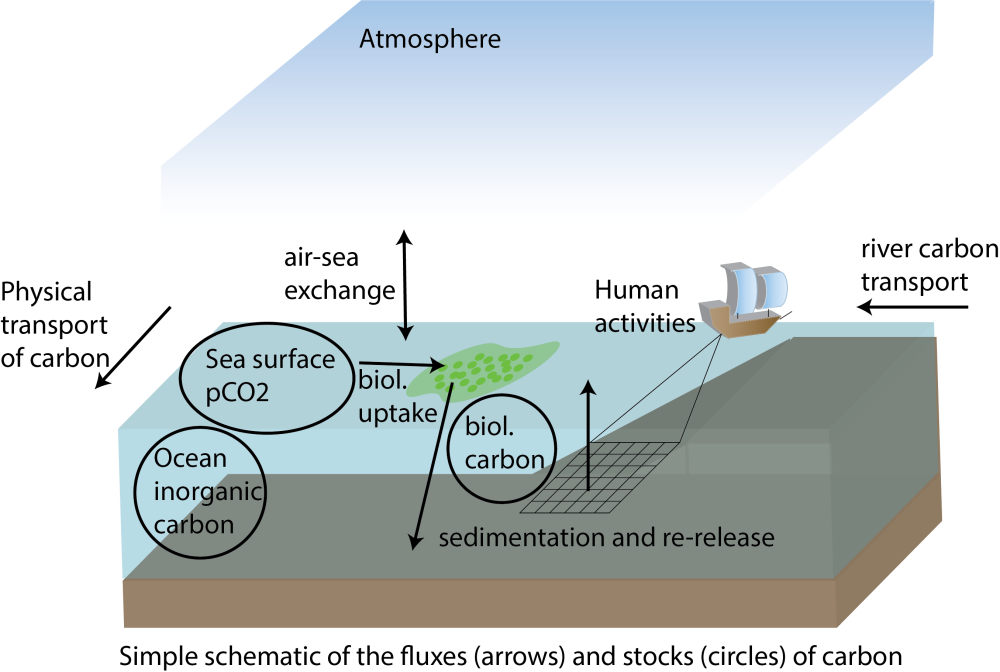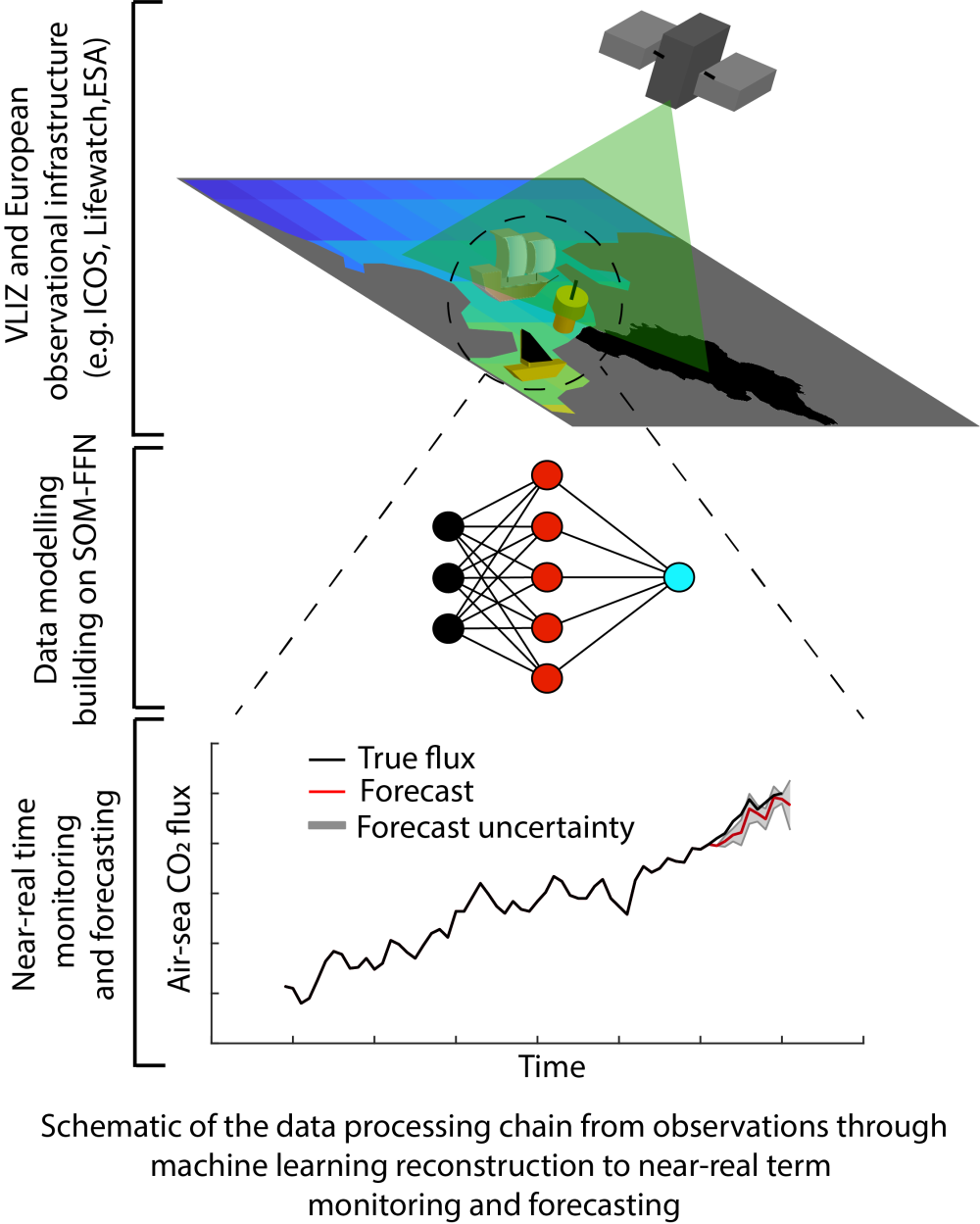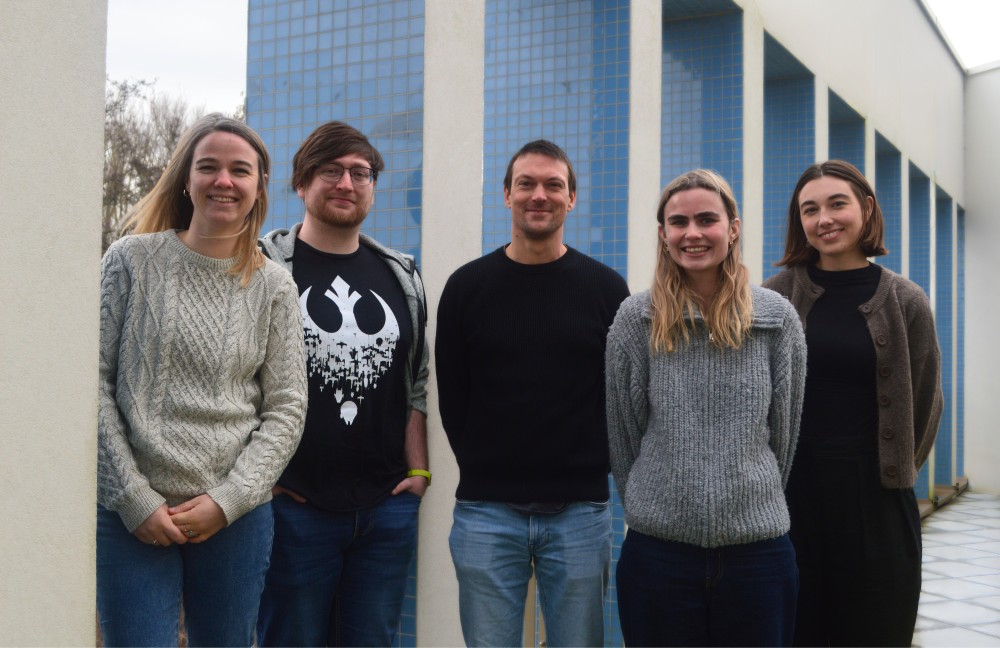De oceaan fungeert als een belangrijke put voor door de mens geproduceerde koolstofdioxide en heeft een belangrijk potentieel voor op de natuur gebaseerde oplossingen voor klimaatverandering. De exploitatie van deze oplossingen vereist echter inzicht in de processen die de mariene koolstofcyclus sturen en de variaties ervan in ruimte en tijd, aan de Belgische kust, op het Europese plat en in de wereldwijde oceaan.
Om schattingen te maken van de opname en opslag van broeikasgassen ter ondersteuning van regionale en mondiale koolstofbudgetanalyses, maakt VLIZ optimaal gebruik van de schat aan gegevens die zijn verzameld via de ICOS- en LifeWatch-campagnes.


Wij ontwikkelen nieuwe technieken op basis van machinaal leren om metingen op te schalen, langetermijnveranderingen in het BPNS te onderzoeken en de respons op extreme gebeurtenissen zoals mariene hittegolven te bestuderen.
Voorts zijn wij betrokken bij de ontwikkeling en exploitatie van instrumenten en nieuwe meetplatforms om het observatiesysteem te verbeteren en bij de evaluatie van het aardsysteemmodel.
Hoewel de belangrijkste onderzoeksfocus voortkomt uit de wens om de hedendaagse koolstofcyclus te begrijpen, behoren zowel veranderingen in het verleden als toekomstige voorspellingen tot de portefeuille van onze onderzoeksgroep. Onze op gegevens gebaseerde schatting van de CO2-uitwisseling tussen lucht en zee (SOM-FFN) wordt veel gebruikt, bijvoorbeeld door beoordelingsstudies zoals de Global Carbon Budget of het 6e beoordelingsrapport van het IPCC.
The team

Dr. Peter Landschützer (Peter.Landschutzer@vliz.be) - Head of Research Group
"While being interested in many aspects of the ocean in the Earth system, my own research focus is set on ocean biogeochemistry and the marine carbon cycle. My expertise ranges from CO2 measurements through big data modelling using artificial neural networks. I am particularly interested in natural and man-made changes in the air-sea CO2 exchange on climate relevant temporal, and from local to global spatial scales."
Meer informatie over mij hier: https://www.peterlandschutzer.com
Dr. Alizée Roobaert (Alizee.Roobaert@vliz.be)
"I specialize in ocean biogeochemistry and the marine carbon cycle, with a focus on air-sea CO2 exchange across different spatial and temporal scales. My work advances our understanding of CO2 sources and sinks, particularly in coastal seas. Utilizing global biogeochemical model outputs and observation-based machine learning techniques, I investigate the complex interplays of physical and biogeochemical processes controlling these CO2 fluxes as well as their variations in time and space, providing essential insights into the coastal ocean's role in the global carbon cycle."
Andrea van Langen Rosón (Andrea.van.Langen@vliz.be)
"As a PhD student in the PPFC group and Griet Neukermans' MarSens group at UGent, my research focuses on understanding the physical and biological drivers of carbon fluxes and their spatiotemporal variability in the complex coastal ocean. To study this, I develop highly resolved data products of coastal carbon fluxes and their drivers by combining remote sensing, in situ observations, and machine learning approaches. My work contributes to the BERNARDO project, addressing critical gaps in our understanding of the coastal carbon cycle to support blue carbon initiatives."
Maurie Keppens (Maurie.Keppens@vliz.be)
"My PhD research, conducted within the PPFC group and the MarSens group led by Griet Neukermans at UGent, is part of the VLAIO BERNARDO project. This initiative aims to bridge the global knowledge gap surrounding the coastal carbon cycle, with a test case focused on the Belgian part of the North Sea, utilizing in-situ measurements, novel machine learning techniques, and remote sensing data. My primary focus within this project will be on the dissolved inorganic carbon component. Additionally, I will explore the influence of extreme events on coastal carbon dynamics, linking this aspect to the European AI4PEX project."
Dr. Daniel Burt (Daniel.Burt@vliz.be)
"I am an ocean biogeochemist specialising in the marine carbon and nitrogen cycles, their variability and interactions with climate. In the PPFC group, I am working towards the reconstruction of ocean heat and carbon fluxes and transport in the Southern Ocean from existing sparse and unevenly distributed in-situ observations and satellite-based data products as part of the European AI4PEX project."
For further information about me: https://danieljburt.github.io/Dr. Arianna Olivelli (Arianna.Olivelli@vliz.be)
"I am a chemical oceanographer, with expertise ranging from analysing the composition of seawater in the laboratory to leveraging data science and modelling techniques to investigate the distribution of chemicals at the regional and global scale. My research aims to advance our understanding of the impacts of human activities on marine climate change, including the marine carbon and oxygen cycles, and environmental pollution, such as that caused by trace metals and plastics. In the PPFC group, I work on the InMOS project, which focuses on integrating models and observations of marine carbon, oxygen and heat across scales."
Recente en relevante publicaties
- Roobaert, A., Regnier, P., Landschützer, P., and Laruelle, G. G.: A novel sea surface pCO2-product for the global coastal ocean resolving trends over 1982–2020, Earth Syst. Sci. Data, 16, 421–441, https://doi.org/10.5194/essd-16-421-2024, 2024.
- Friedlingstein, P., et al., Gkritzalis, T., et al., Landschützer, P., et al. (110 authors), 2022. Global Carbon Budget 2022. Earth Syst Sci Data 14, 4811–4900. https://doi.org/10.5194/essd-14-4811-2022
- Gruber, N., Bakker, D.C.E., DeVries, T., Gregor, L., Hauck, J., Landschützer, P., McKinley, G.A., Müller, J.D., 2023. Trends and variability in the ocean carbon sink. Nat Rev Earth Environ 4, 119–134. https://doi.org/10.1038/s43017-022-00381-x
- Landschützer, P., Tanhua, T., Behncke, J., Keppler, L., 2023. Sailing through the southern seas of air–sea CO 2 flux uncertainty. Philosophical Transactions of the Royal Society A: Mathematical, Physical and Engineering Sciences 381. https://doi.org/10.1098/rsta.2022.0064
- Ostle, C., Landschützer, P., Edwards, M., Johnson, M., Schmidtko, S., Schuster, U., Watson, A.J., Robinson, C., 2022. Multidecadal changes in biology influence the variability of the North Atlantic carbon sink. Environmental Research Letters 17, 114056. https://doi.org/10.1088/1748-9326/ac9ecf
Projecten
SOCOM – Surface Ocean CO2 Mapping intercomparison project
BERNARDO - The partners in the BERNARDO project examine the potential of marine carbon for a sustainable blue economy
AI4PEX - Artificial Intelligence for enhanced representation of processes and extremes in Earth System Models
InMOS - Integration of models and observations across scales
TRICUSO - Three Research Infrastructures together: Carbon Uptake Southern Ocean
